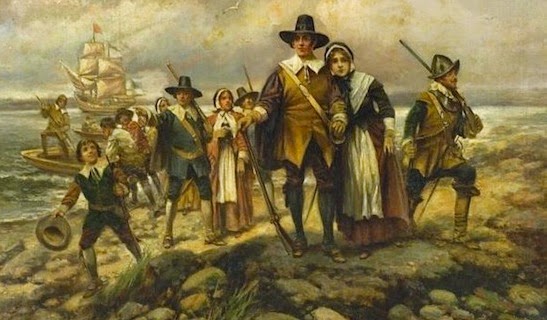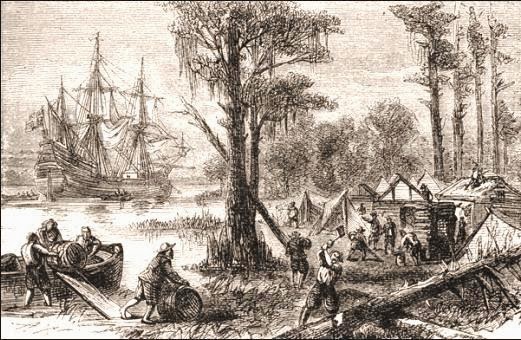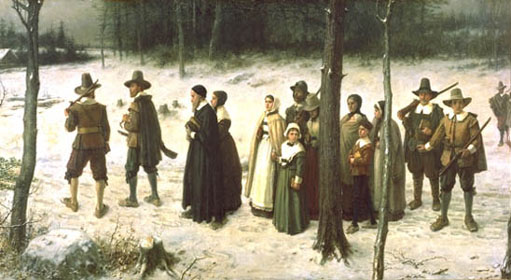THE GRAVE PREMONITION

New Hope
Romans 13:12-14
* * *
GOVERNOR ESMOND STATHAM
Dost thou recall thy days in the Old World? Dost they not feel so far removed from the present? But ye wouldst be wise to remember that dreaded time -- not so long ago -- when we dwelled and suffered beneath the weight of oppression; when we faced persecution for our adherence to Truth; when we faced charges of "heresy" against the quasi-Roman doctrines of the English Church. 'Twas by the light of the Reverend Mister Charles Braxton that we navigated those dark years. Through him and the Will of the Heavenly Father, we did survive to act upon our preordained mission.
In the year of our Lord, sixteen hundred and thirty two, our swelling congregation was permitted a land patent. Purchased with the consent of His Majesty, King Charles the First, from the Plymouth Council for the New England Realm, we were licensed to settle those coastal bays north of the Sagadahoc. And 'twas I, by whose coin said patent was procured, who was chosen to lead our people in the name of the Lord.
We left at the vernal equinox of the subsequent spring -- a goodly fleet of nine vessels under the flagship Ethel, carrying with them our eight hundred and twenty strong assemblage of the Faithful. What a glorious day it was! God's gentle breeze did hasten our departure, and we did watch the Isles vanish over the horizon...abandoned to rot in the pits of corruption.
The journey was long, trying, and arduous. 'Twas during those months, fraught with toil, that our Faith was first tested beyond England's borders. Through the tempestuous storms, we held fast to God. Through the outbreak of malady, we did trust in the Scriptures. Through the upsurge of internal strife, we found unity and comfort in our Lord and Savior.
Landfall was not made until May. Thirteen lives had been lost, including that of our beloved Reverend Charles Braxton. Like the Prophet Moses of Exodus, he did gaze upon the coasts of the New World from a distance. And as he slipped into Death's embrace -- a fate for which we are all destined -- the Reverend did whisper, "We have found new hope."
And so New Hope was thereby christened.
That Harvest was the calm before the rise of winter's terror -- our first test of Faith in the Promised Land. The ice and winds came upon us like the Devil...and with them came a storm of suffering unlike any we had seen in Old England. For 'twas during that dreadful season that the savages did make themselves known. They crept from the Hollow Dark like wolves, and they feasted upon our fears in emulation of their Fallen gods. They took mine eldest son...my sweet child...and left his widowed love to weep in a river of her husband's blood. Herod, as their wretched King is called, did bring death and fire to our very doorsteps! How bold of the Devil to confront our Lord's people so brashly!
I...I apologize. Methinks I hast lost my temper. But canst thou blame me for such righteous anger? Perhaps you, too, suffered loss amidst the First Winter's chaos.
But let us shout our praise to the Lord, for He is a just and merciful God! 'Twas through the actions of Captain Robert Maxley that our Heavenly Father did save His people from Herod's wrath. His victory predestined by the Will of the Holy Spirit, the good Captain fought back against the savage war bands. The snow was stained red, and the airs grew thick with the clouds of gunpowder smoke. But we prevailed, and drove the beastfolk back at the Battle of Scarlet Oak. They fled into the wilderness from whence they had risen...condemned to eternal squalor in the hollows' darkness. The Treaty of Kenduskeag secured a momentary peace, finally allowing our people to rebuild. Many Faithful were lost to the bloodlust of Herod's shriekers. Men...women...children...even I couldst not have predicted such harrowing destruction. Perhaps, for but a moment, I did wonder if...
Ah, look at me. I have so little power over mine heart's sorrows since the death of my William. He was among the first to die at their wretched hands. Wouldst thou forgive the despondency of thine Governor?
The First Winter did end, as all winters do, with the dawn of the spring's sun. And with its arrival came new blessings and beginnings for all. As we rebuilt what was lost to us in battle with Herod's devils, three merchants' masts appeared on the horizon: the Maryann, the Mina, and the Juneberry. Upon them were, to our great astonishment, another two hundred Faithful from England. God is a mighty and virtuous Father!
And so here we do sit, my friend -- testament to the might of God's love and protection. New Hope hath survived...and we are here to stay. We will continue to build and continue to praise, for we are the Faithful harbingers of Truth.
Now...enough talk. We do not accomplish Godly work in mere conversation. Go, and labor until the sun sets. The Harvest awaits ye, and the chill of winter approaches with great haste.
Faith
1 Peter 5:8-9
* * *
REVEREND CREEDENCE DENHOLM
I would offer sustenance of food and drink, but...well, I've simply used up my reserve. Our next shipment of supplies is not due for yet another week. A pity that we continue to rely on English trade to maintain continued survival.
I digress. What is it you ask? You wish to learn of our Faith? To examine its inner workings in pursuit of Truth and Holiness? 'Tis a task to which I have dedicated my life -- and you as well, having travelled so far to our New Hope!
We, the congregation, trace our origins back to the teachings of the Reverend Mister Charles Braxton. In accepting said teachings, we acknowledge that it is only by Scripture alone, sola scriptura, through which the Heavenly Father bestows His Truth upon humanity; that said Truths, each held as undeniable fact, are paramount to the physical and spiritual being of every Christian on Earth. In this, we adhere to the Reformed tradition of our forefathers. It therefore falls upon us to reject the false doctrines of the Roman Whore, and indeed any tenants which art unfounded by our Heavenly Father's Scriptures. Aye, such a righteous mission does place us beyond the limits of Rome's bastard sister, the Church of England -- an institution from which we have separated altogether...as she, too, is surely beyond redemption in the eyes of God. Had we not done so, could we have ever hoped to gain access to His eternal mercy in death?
For we -- Men -- are inexorably corrupted by the First Sin. 'Tis, of course, sewn into the fabric of our mortal nature. We are enslaved and grotesquely captivated by the Enemy's temptations, thus rendering our souls incapable of Salvation by mere self-intent. From the very moment conception, we are separated from the spiritual borders of His Heavenly Kingdom. Action alone cannot redeem us. Indeed, 'tis purely through the qualified atonement of Christ that the Faithful Elect may receive His grace. Such are our fates, each individually sewn a millennia before our creation. 'Tis written in the Scriptures that said grace is effectual only in those souls destined to achieve Paradise eternal.
Let not the paradoxical notion of free will confound ye. For the will of Man, while unobstructed to all intents and purposes, is nevertheless subject to the supreme authority of God. Were it not so, could He possibly foresee our preordained grace...or lack thereof? Nay! And thus it is held that His sovereignty is absolute in every sense of the word.
These are the terms of the holy covenant, which was gifted to us from His boundless love and compassion. But one must bear in mind the coequal being of the Faithful, and know that we are all bound by said covenantal terms. No man, be he king or peasant, reverend or congregant, hath inherent superiority in the eyes of our Heavenly Father. Faith is, by its very nature, an everlasting struggle to cope with the divine Truths. And so 'tis unknown even to men such as I, lifelong devotees and ministers of the Scriptures, which among us stand with the Elect of Christ. I daresay each of us act in accordance with our own fates beyond earthly life. Art thou destined for Heaven? Am I? Only God Himself can be certain. What a glorious test of Faith!
I tell you, my friend, our only hope for continued spiritual survival is to hold fast to our worship and the sincerity of our praise! We are the Faithful! We are the beloved children of God! Doest this not excite you? Oh, it brings much joy to this feckless and sinful heart of mine! It is our task...no, our absolute duty...to study the Scriptures and bask in His profound glory! For it is through the Scriptures that he speaks to us and draws us ever nearer to His holy light.
But be weary of falsehood in interpreting His Word...for there are those -- even among our own people -- who would dare turn their backs upon our Truths. What grand heresies they preach. They, the heathen charlatans, mountebanks, and impostors of Faith would entice ye to gaze at their wicked ways in envy. Like master smiths, they bend and contort the Scriptures to aid in their own endeavors. A vile craft indeed. The Reverend Braxton, in his inspired wisdom, foresaw the advent of such monstrous heresies. And so he called for the inception of the Pastoral Synod of Ministers, a board upon which I humbly sit today, to defend the Lord's Word against all who would defile it.
The Synod is a body of our community's reverends, tasked with reaffirming the Truths of the Scriptures and prosecuting that which would drive our congregants against one another. We are a council without ranks, each holding entirely equal representation, and it is by our actions that we maintain spiritual order and unity throughout this colony. In England, we did battle with the falsehoods of His Majesty's Church. But here, in New Hope, we find ourselves at odds with our own former brothers and sisters in Christ.
Be warned: we do not tolerate heresies within the bounds of New Hope. Such crimes may result in fines, permanent expulsion...or even death. 'Tis necessary to sustaining the pure and divine favor of our Lord in Heaven. These are our rules and customs. But you know of this, do you not?
I sense that I have spoken enough. Hast thou further inquiries? No? Then you must go and continue about thy labors, just as I shall do mine. Praise be to God! And may His blessings be upon you!
New World, Old Problems
James 2:5-6
* * *
MRS HARRIET WILKERSON
Some such as I, or such as my husband, Arthur, see the truth for what it is: that the Stathams -- the Stuarts of the Mayne -- and their circle of devils are but tyrants replicating the ways of old. Canst thou recognize their folly? Their abuse of power under Godly pretense? The deception of our age. I do declare my shame to have fallen under their wicked spell. "New Hope?" Nay...False Hope wouldst prove a more genuine description.
There was a time when I did harbor faith in the prosperous future of our colony. But I, like so many others, soon found myself snared by the fallacious promises of our Governor. He and his Council hath forged in New Hope a defiled kingdom of oppression. The signs were clear from the beginning, but our eagerness to abscond the dark hold of England was too great. We sold ourselves to the Stathams' will.
Hast thou seen this colony's government? 'Tis a crude imitation of ye olde country, and lacking in the determinate autonomies mandated by Scripture. Governor Esmond Statham reigns as unelected King-Pretender. And his Deputy Governor, the self-serving Ernest Blackmohr, has assumed heightened power in the wake of the late William Statham's demise. Aye, that William Statham -- miscreant, fornicator, and betrayer of sanctitude! That he was among the first to fall in the Winter's Dread was nothing short of divine providence. But what grief his doom hath caused his father, and what future sufferings it did guarantee for the people of New Hope!
The Governor dares call his ten-man Council an "elective body," but didst thou and I forgo its election? In truth, the Councilmen were elected by the richest of our people -- those whose contributions secured these lands of the Mayne. The Councilmen are but the new gentry, and they bend to the very will of the Governor.
Wherefore does my hatred burn so bright? Is Wrath, a Deadly Sin, not condemned in the Word of our Lord? Indeed, it is. But even I, a most Faithful daughter of God, have lost my purity of heart to suffering. The Governor and his Council are an incompetent bunch, their reign sustained and fueled by the false spiritual dogmas of the Pastoral Synod. Doth the Synod, too, act on behalf of the Stathams? Undoubtedly so. The Reverend Creedence Denholm, charming in his words yet foul in his intentions, hath even married into Statham blood. The Synod is an extension of our Governor's authority. Esmond's rule hath stretched beyond spiritual bounds, and enslaved the Faithful in the entirety of their being.
Ye shall not witness the Governor nor his Synod mention said atrocities. Two hundred and sixty six lives claimed in the war with Herod's barbarians. And for what? I ask thee, for what? Mine own husband lost an eye and hand in battle with those monsters. An eye and hand for a war that was not ours.
What Scripture justifies these hellacious abuses? There is none. New Hope hath fallen to the ways of the Old World, which we had thought to have been left behind in England. This poverty, this death, this denial of Man's natural rights as the Faithful Children of God! The Lord doth not speak through a Synod, nor through an aristocracy of feeble-minded men. The Lord speaketh through His Word alone! Who are the Stathams or ministers to deny us His love? Is this colony our New Hope, or our New Rome?
As the ranks of we like-minded Faithful swell, the power of our superiors dwindles. We do not stand against tyranny alone. Hear the Scriptures! Witness our Lord's favor firsthand! The Reverend Jethro Hackett, whose springtime arrival on the blessed Juneberry signified the advent of change, hath given a voice to those who were once unheard!
And so I ask thee, fellow Child of God...where dost thou stand?
The Natives
1 Corinthians 10:19-20
* * *
CAPTAIN ROBERT MAXLEY
Aye, I will tell you. The natives of yonder Hollow Dark be called the "Penobscot." They be neither good nor evil folk, but rather folk of unchristian design. They have been proven capable of seeing our Lord and Savior's light, but few among them dare bow to our God. Instead, they offer praise to their Glooscap creator -- no doubt a Fallen in disguise.
But they be a secretive people. Their ways are much unknown to us. Methinks 'tis their introversion which frightens us most. Even our reborn Henry Fox, who stood among them in times passed, doth divulge so little as to their confidences. It intrigues me, it does. But at the same time, it raises mine own suspicions.
You ponder on their motive for attacking New Hope? Their purpose for bringing the Dread storm of the First Winter upon us? Heh...some questions are not meant to be answered. Was it for honor? Was it out of fear? Their inducements are beyond our own comprehension. Mister Fox claims 'twas their duty to defend the "sacred" lands of Gluskabe. Doth he speak truthfully? Who is to say?
The man they call "King Herod" -- 'tis not his true name. He is Megeso, the Great Eagle, in the tongue of his own people. I have seen him in the flesh meself; a magnificent man. He is their war chieftain, and a leader as wise as he is strong. Our Governor did label him "Herod" upon the loss of William, the eldest Statham child, to the first of Megeso's raids. I think it an unjustified slander, I do. For we, too, took the lives of many Penobscot sons in battle. Unchristian, they are, but not unhuman.
I digress. This is not philosophical talk. We repelled their raids at the height of the First Winter, and pursued them into the Hollow Dark. 'Tis a cursed place, I tell you -- a place inhabited by the gods of witches. There, we fought the Battle of Scarlet Oak...and won. A narrow victory, I assure you. But when the savage warriors fled, Megeso did extend an offering of peace. Fox and I negotiated the terms, but not within reaches of New Hope. We were forced to brave the wilderness and enter the chieftain's very den. I do admit that the sight of that village caused me great distress. Disease and terror had gripped them in body and soul. I daresay their suffering was greater than that of we the Faithful.
By day's end, we had struck the terms of the Treaty of Kenduskeag; a cease of bloodshed, if you will. The Dread was costly to both sides. It had been enough.
But one would be foolish to think the war passed. Canst you not feel them watching from the Hollows? Waiting? Searching for the perfect moment in which to strike again? The Council hath dismissed the militia, as the "eminent threat hath faded." They are fools. One day soon, Megeso will rise once more. And the death he conjures forth shall surpass any ye hast seen thus far.













